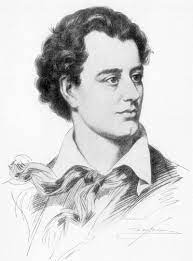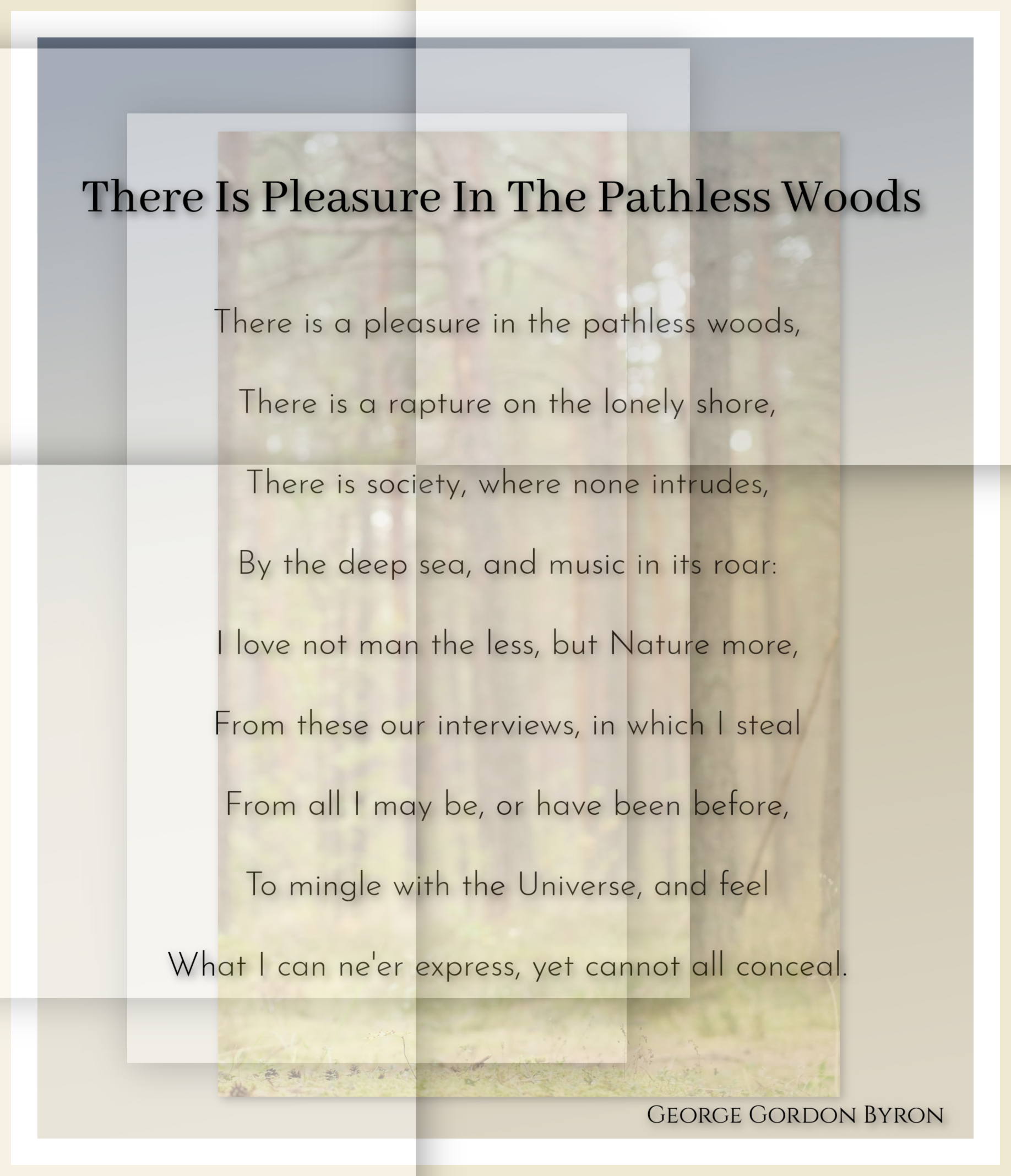
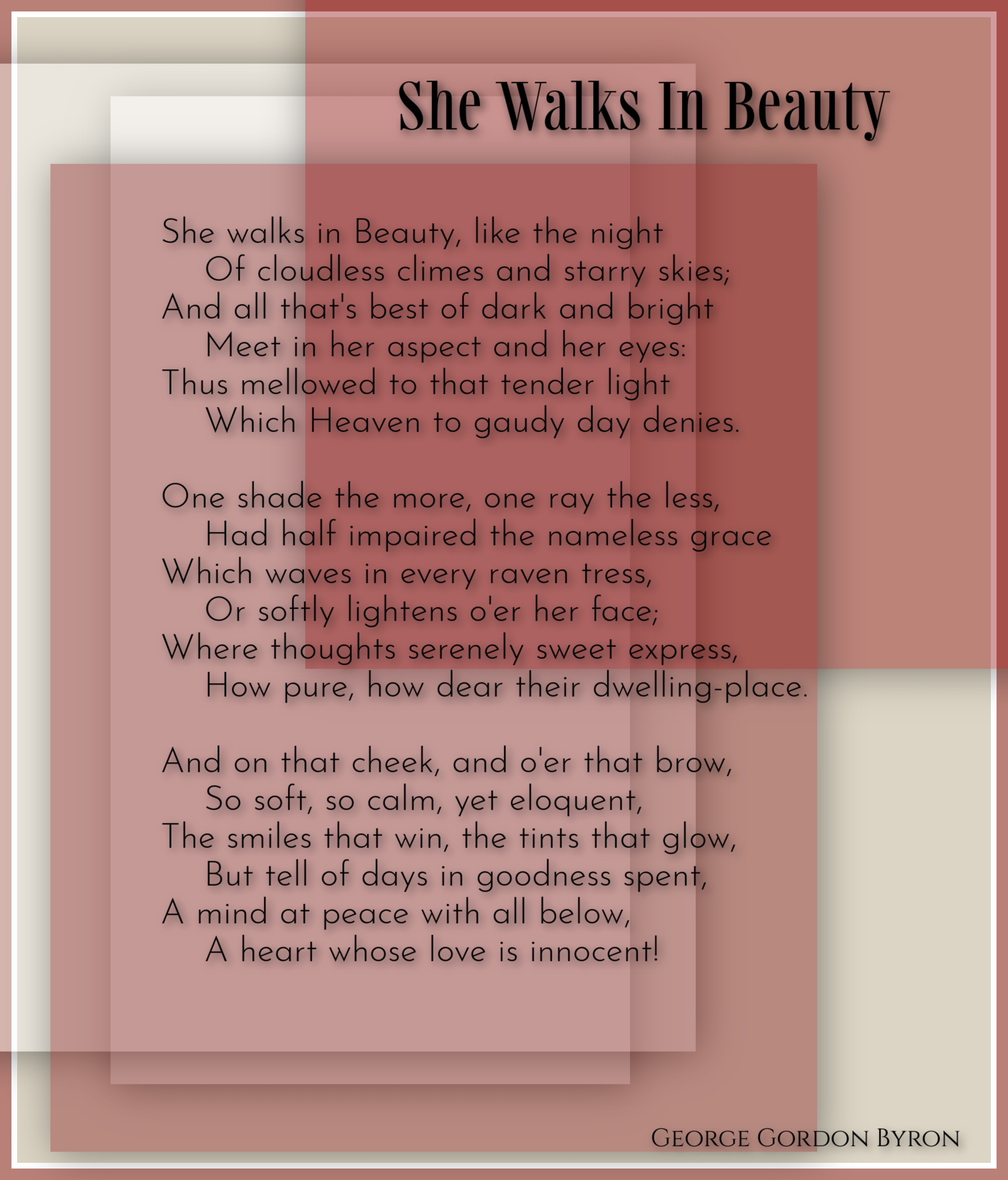
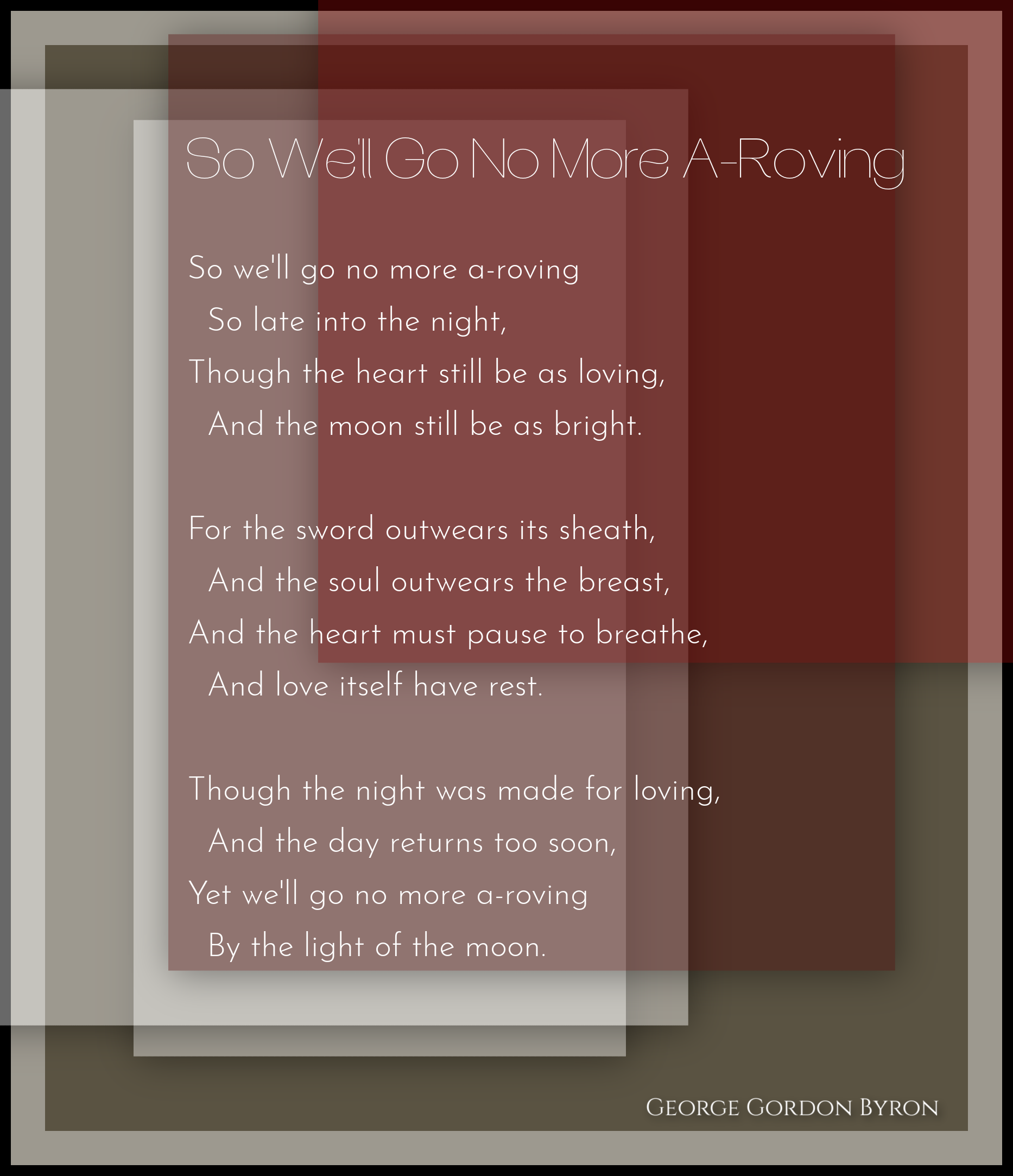
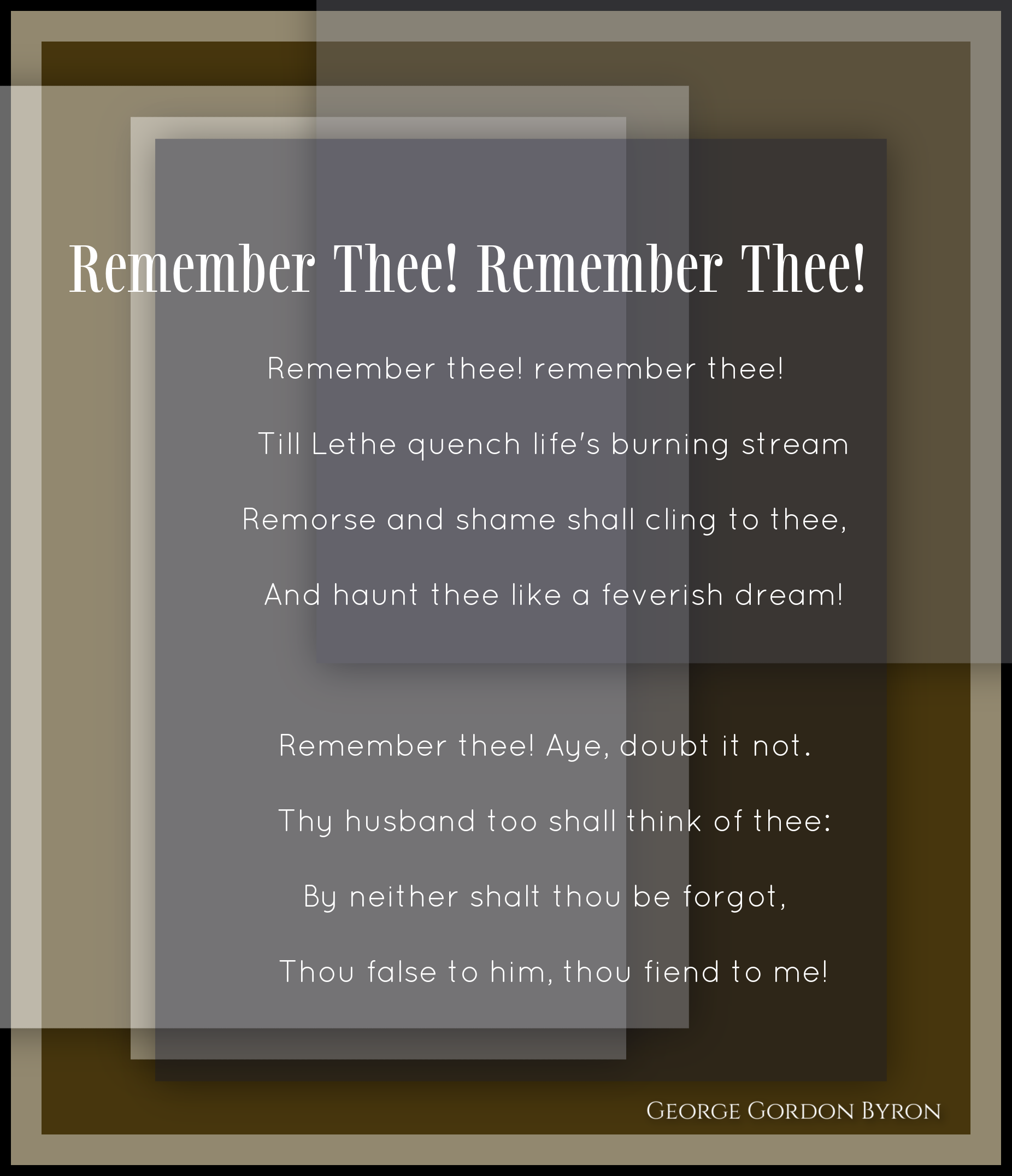
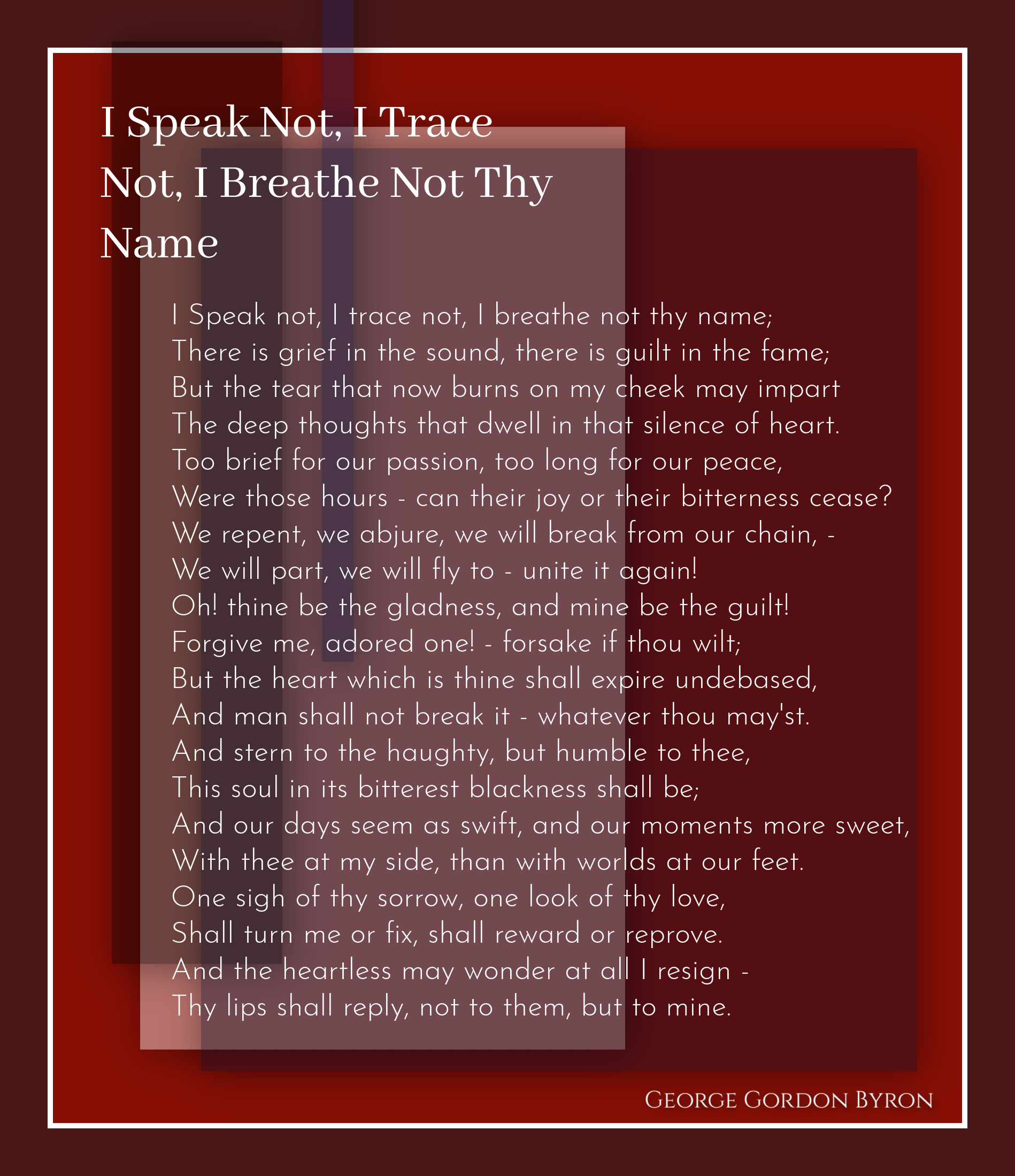
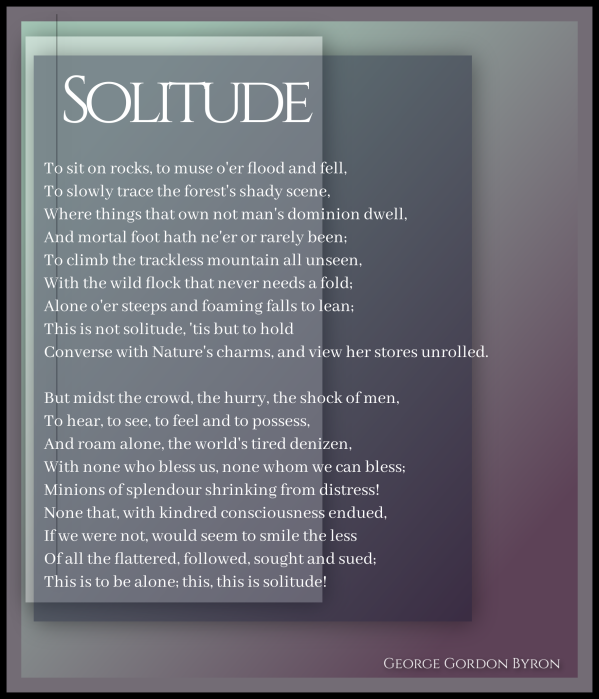
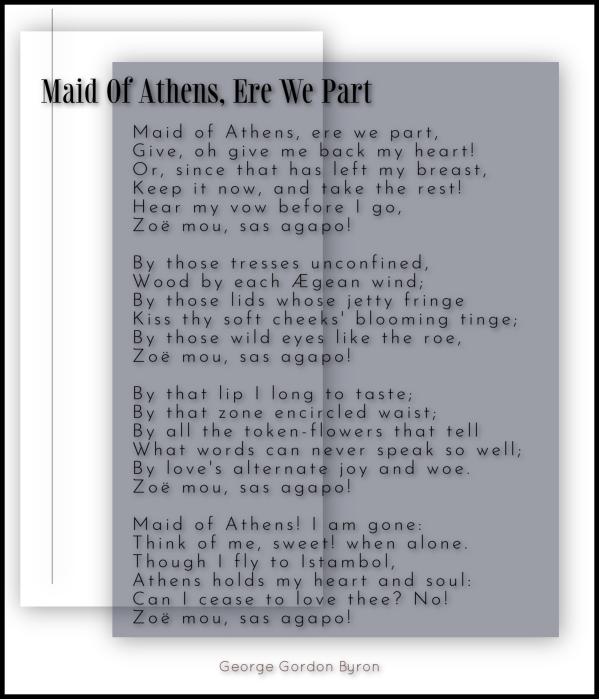
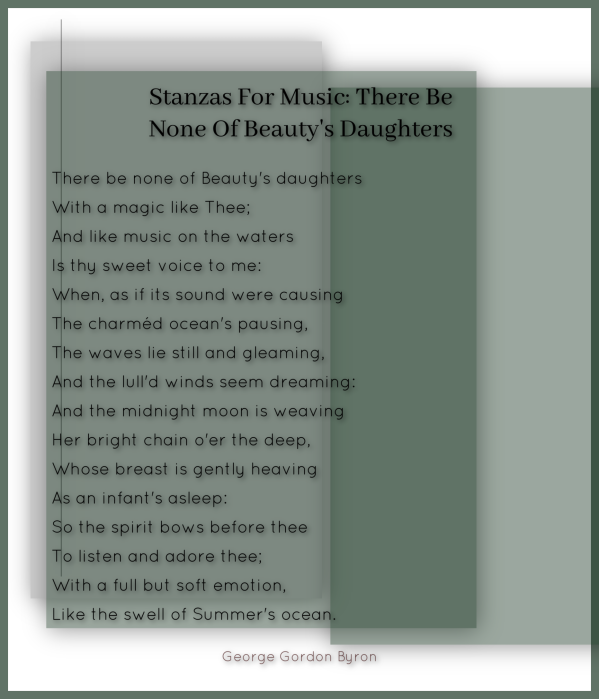
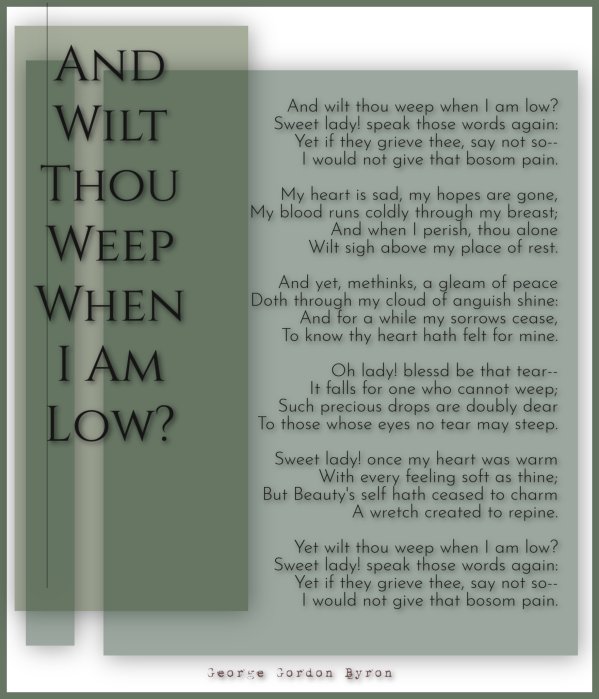
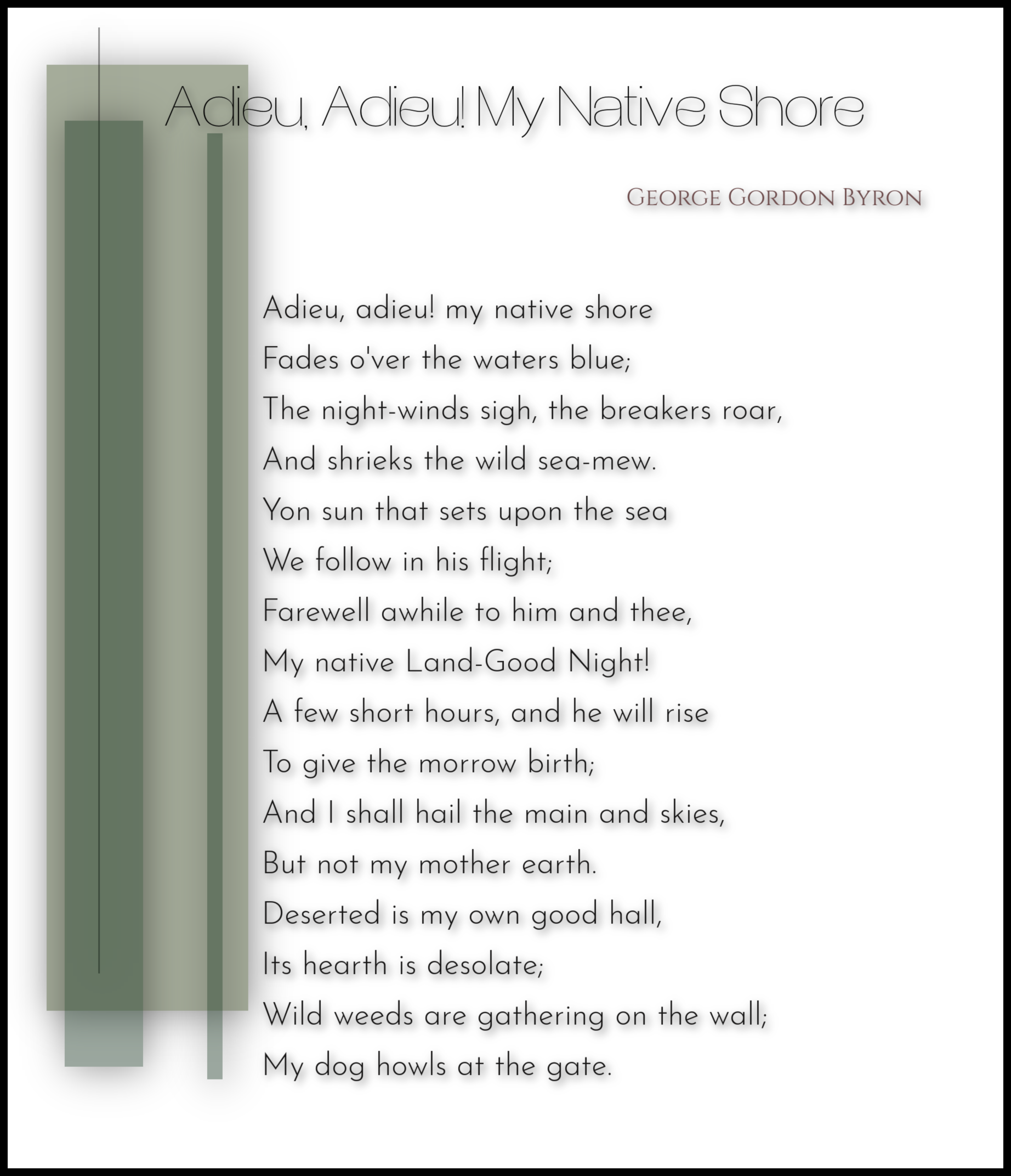
The Destruction Of Sennacherib
I.
The Assyrian came down like the wolf on the fold,
And his cohorts were gleaming in purple and gold;
And the sheen of their spears was like stars on the sea,
When the blue wave rolls nightly on deep Galilee.
Like the leaves of the forest when Summer is green,
That host with their banners at sunset were seen:
Like the leaves of the forest when Autumn hath blown,
That host on the morrow lay withered and strown.
II.
For the Angel of Death spread his wings on the blast,
And breathed in the face of the foe as he pass'd,
And the eyes of the sleepers wax'd deadly and chill,
And their hearts but once heaved, and for ever grew still!
And there lay the steed with his nostril all wide,
But through it there roll'd not the breath of his pride;
And the foam of his gasping lay white on the turf,
And cold as the spray of the rock-beating surf.
III.
And there lay the rider distorted and pale,
With the dew on his brow, and the rust on his mail:
And the tents were all silent, the banners alone,
The lances unlifted, the trumpets unblown.
And the widows of Ashur are loud in their wail,
And the idols are broke in the temple of Baal;
And the might of the Gentile, unsmote by the sword,
Hath melted like snow in the glance of the Lord!
The Eve Of Waterloo
There was a sound of revelry by night,
And Belgium's capital had gathered then
Her beauty and her chivalry, and bright
The lamps shone o'er fair women and brave men.
A thousand hearts beat happily; and when
Music arose with its voluptuous swell,
Soft eyes looked love to eyes which spake again,
And all went merry as a marriage bell;
But hush! hark! a deep sound strikes like a rising knell!
Did ye not hear it? — No; 'twas but the wind,
Or the car rattling o'er the stony street;
On with the dance! let joy be unconfined;
No sleep till morn, when youth and pleasure meet
To chase the glowing hours with flying feet.
But hark! — that heavy sound breaks in once more,
As if the clouds its echo would repeat;
And nearer, clearer, deadlier than before;
Arm! arm! it is — it is — the cannon's opening roar!
Within a windowed niche of that high hall
Sate Brunswick's fated chieftain; he did hear
That sound the first amidst the festival,
And caught its tone with death's prophetic ear;
And when they smiled because he deemed it near,
His heart more truly knew that peal too well
Which stretched his father on a bloody bier,
And roused the vengeance blood alone could quell;
He rushed into the field, and, foremost fighting, fell.
Ah! then and there was hurrying to and fro,
And gathering tears, and tremblings of distress,
And cheeks all pale, which, but an hour ago,
Blushed at the praise of their own loveliness.
And there were sudden partings, such as press
The life from out young hearts, and choking sighs
Which ne'er might be repeated; who would guess
If ever more should meet those mutual eyes,
Since upon night so sweet such awful morn could rise!
And there was mounting in hot haste; the steed,
The mustering squadron, and the clattering car,
Went pouring forward with impetuous speed,
And swiftly forming in the ranks of war;
And the deep thunder, peal on peal afar;
And near, the beat of the alarming drum
Roused up the soldier ere the morning star;
While thronged the citizens with terror dumb,
Or whispering, with white lips — "The foe! they come! they come!"
Prometheus
I.
Titan! to whose immortal eyes
The sufferings of mortality,
Seen in their sad reality,
Were not as things that gods despise;
What was thy pity's recompense?
A silent suffering, and intense;
The rock, the vulture, and the chain,
All that the proud can feel of pain,
The agony they do not show,
The suffocating sense of woe,
Which speaks but in its loneliness,
And then is jealous lest the sky
Should have a listener nor will sigh
Until its voice is echoless.
II.
Titan! to thee the strife was given
Between the suffering and the will,
Which torture where they cannot kill;
And the inexorable Heaven,
And the deaf tyranny of Fate,
The ruling principle of Hate,
Which for its pleasure doth create
The things it may annihilate,
Refused thee even the boon o die:
The wretched gift eternity
Was thine - and thou hast borne it well.
All that the Thunderer wrung from thee
Was but the menace which flung back
On him the torments of thy rack;
The fate thou didst so well foresee,
But would not to appease him tell;
And in thy Silence was his Sentence,
And in his Soul a vain repentance,
And evil dread so ill dissembled,
That in his hand the lightnings trembled.
III.
Thy Godlike crime was to be kind,
To render with thy precepts less
The sum of human wretchedness,
And strengthen Man with his own mind;
But baffled as thou wert from high,
Still in thy patient energy,
In the endurance, and repulse
Of thine impenetrable Spirit,
Which Earth and Heaven could not convulse,
A mighty lesson we inherit:
Thou art a symbol and a sign
To Mortals of their fate and force;
Like thee, Man is in part divine,
A troubled stream from a pure source;
And Man in portions can foresee
His own funereal destiny;
His wretchedness, and his resistance,
And his sad unallied existence:
To which his Spirit may oppose
Itself - and equal to all woes,
And a firm will, and a deep sense,
Which even in torture can descry
Its own concenter'd recompense,
Triumphant where it dares defy,
And making Death a Victory.
Darkness
I had a dream, which was not all a dream.
The bright sun was extinguish'd, and the stars
Did wander darkling in the eternal space,
Rayless, and pathless, and the icy earth
Swung blind and blackening in the moonless air;
Morn came and went--and came, and brought no day,
And men forgot their passions in the dread
Of this their desolation; and all hearts
Were chill'd into a selfish prayer for light:
And they did live by watchfires--and the thrones,
The palaces of crowned kings--the huts,
The habitations of all things which dwell,
Were burnt for beacons; cities were consumed,
And men were gather'd round their blazing homes
To look once more into each other's face;
Happy were those who dwelt within the eye
Of the volcanos, and their mountain-torch:
A fearful hope was all the world contain'd;
Forests were set on fire--but hour by hour
They fell and faded--and the crackling trunks
Extinguish'd with a crash--and all was black.
The brows of men by the despairing light
Wore an unearthly aspect, as by fits
The flashes fell upon them; some lay down
And hid their eyes and wept; and some did rest
Their chins upon their clenched hands, and smiled;
And others hurried to and fro, and fed
Their funeral piles with fuel, and look'd up
With mad disquietude on the dull sky,
The pall of a past world; and then again
With curses cast them down upon the dust,
And gnash'd their teeth and howl'd: the wild birds shriek'd
And, terrified, did flutter on the ground,
And flap their useless wings; the wildest brutes
Came tame and tremulous; and vipers crawl'd
And twined themselves among the multitude,
Hissing, but stingless--were slain for food.
And War, which for a moment was no more,
Did glut himself again:--a meal was bought
With blood, and each sate sullenly apart
Gorging himself in gloom: no love was left;
All earth was but one thought--and that was death
Immediate and inglorious; and the pang
Of famine fed upon all entrails--men
Died, and their bones were tombless as their flesh;
The meagre by the meagre were devour'd,
Even dogs assail'd their masters, all save one,
And he was faithful to a Gorse, and kept
The birds and beasts and famish'd men at bay,
Till hunger clung them, or the dropping dead
Lured their lank jaws; himself sought out no food,
But with a piteous and perpetual moan,
And a quick desolate cry, licking the hand
Which answer'd not with a caress--he died.
The crowd was famish'd by degrees; but two
Of an enormous city did survive,
And they were enemies: they met beside
The dying embers of an altar-place
Where had been heap'd a mass of holy things
For an unholy usage; they raked up,
And shivering scraped with their cold skeleton hands
The feeble ashes, and their feeble breath
Blew for a little life, and made a flame
Which was a mockery; then they lifted up
Their eyes as it grew lighter, and beheld
Each other's aspects--saw, and shriek'd, and died--
Even of their mutual hideousness they
Unknowing who he was upon whose brow
Famine had written Fiend. The world was void,
The populous and the powerful was a lump,
Seasonless, herbless, treeless, manless, lifeless,
A lump of death--a chaos of hard clay.
The rivers, lakes, and ocean all stood still,
And nothing stirr'd within their silent depths;
Ships sailorless lay rotting on the sea,
And their masts fell down piecemeal: as they dropp'd
They slept on the abyss without a surge
The waves were dead; the tides were in their grave,
The moon, their mistress, had expired before;
The winds were wither'd in the stagnant air,
And the clouds perish'd; Darkness had no need
Of aid from them--She was the Universe.
Dear Doctor, I have Read your Play
Dear Doctor, I have read your play,
Which is a good one in its way,
Purges the eyes, and moves the bowels,
And drenches handkerchief s like towels
With tears that, in a flux of grief,
Afford hysterical relief
To shatter'd nerves and quicken'd pulses,
Which your catastrophe convulses.
I like your moral and machinery;
Your plot, too, has such scope for scenery!
Your dialogue is apt and smart;
The play's concoction full of art;
Your hero raves, your heroine cries,
All stab, and everybody dies;
In short, your tragedy would be
The very thing to hear and see;
And for a piece of publication,
If I decline on this occasion,
It is not that I am not sensible
To merits in themselves ostensible,
But—and I grieve to speak it—plays
Are drugs—mere drugs, Sir, nowadays.
I had a heavy loss by Manuel —
Too lucky if it prove not annual—
And Sotheby, with his damn'd Orestes
(Which, by the way, the old bore's best is),
Has lain so very long on hand
That I despair of all demand;
I've advertis'd— but see my books,
Or only watch my shopman's looks;
Still Ivan , Ina and such lumber
My back-shop glut, my shelves encumber.
There's Byron too, who once did better,
Has sent me—folded in a letter—
A sort of—it's no more a drama
Than Darnley , Ivan or Kehama :
So alter'd since last year his pen is,
I think he's lost his wits at Venice,
Or drain'd his brains away as stallion
To some dark-eyed and warm Italian;
In short, Sir, what with one and t'other,
I dare not venture on another.
I write in haste; excuse each blunder;
The coaches through the street so thunder!
My room's so full; we've Gifford here
Reading MSS with Hookham Frere,
Pronouncing on the nouns and particles
Of some of our forthcoming articles,
The Quarterly —ah, Sir, if you
Had but the genius to review!
A smart critique upon St. Helena,
Or if you only would but tell in a
Short compass what—but, to resume;
As I was saying, Sir, the room—
The room's so full of wits and bards,
Crabbes, Campbells, Crokers, Freres and Wards,
And others, neither bards nor wits—
My humble tenement admits
All persons in the dress of Gent.,
From Mr. Hammond to Dog Dent.
A party dines with me today,
All clever men who make their way:
Crabbe, Malcolm, Hamilton and Chantrey
Are all partakers of my pantry.
They're at this moment in discussion
On poor De Sta{:e}l's late dissolution.
Her book, they say, was in advance—
Pray Heaven she tell the truth of France!
'Tis said she certainly was married
To Rocca, and had twice miscarried,
No—not miscarried, I opine—
But brought to bed at forty nine.
Some say she died a Papist; some
Are of opinion that's a hum;
I don't know that—the fellow, Schlegel,
Was very likely to inveigle
A dying person in compunction
To try the extremity of unction.
But peace be with her! for a woman
Her talents surely were uncommon.
Her publisher (and public too)
The hour of her demise may rue,
For never more within his shop he—
Pray—was she not interr'd at Coppet?
Thus run our time and tongues away;
But, to return, Sir, to your play;
Sorry, Sir, but I cannot deal,
Unless 'twere acted by O'Neill.
My hands are full—my head so busy,
I'm almost dead—and always dizzy;
And so, with endless truth and hurry,
Dear Doctor, I am yours,
Love's Last Adieu
The roses of love glad the garden of life,
Though nurtured 'mid weeds dropping pestilent dew,
Till time crops the leaves with unmerciful knife,
Or prunes them for ever, in love's last adieu!
In vain, with endearments, we soothe the sad heart,
In vain do we vow for an age to be true;
The chance of an hour may command us to part,
Or death disunite us in love's last adieu!
Still Hope, breathing peace, through the grief-swollen breast,
Will whisper, 'Our meeting we yet may renew:'
With this dream of deceit, half our sorrow's represt,
Nor taste we the poison, of love's last adieu!
Oh! mark you yon pair: in the sunshine of youth,
Love twined round their childhood his flowers as they grew;
They flourish awhile, in the season of truth,
Till chill'd by the winter of love's last adieu!
Sweet lady! why thus doth a tear steal its way,
Down a cheek which outrivals thy bosom in hue?
Yet why do I ask?---to distraction a prey,
Thy reason has perish'd with love's last adieu!
Oh! who is yon misanthrope, shunning mankind?
From cities to caves of the forest he flew:
There, raving, he howls his complaint to the wind,
The mountains reverberate love's last adieu!
Now hate rules a heart which in love's easy chains,
Once passion's tumultuous blandishments knew;
Despair now inflames the dark tide of his veins;
He ponders in frenzy on love's last adieu!
How he envies the wretch with a soul wrapt in steel!
His pleasures are scarce, yet his troubles are few,
Who laughs at the pang that he never can feel,
And dreads not the anguish of love's last adieu!
Youth flies, life decays, even hope is o'ercast;
No more, with love's former devotion, we sue:
He spreads his young wing, he retires with the blast;
The shroud of affection is love's last adieu!
In this life of probation, for rapture divine,
Astrea declares that some penance is due;
From him, who has worshipp'd at love's gentle shrine,
The atonement is ample in love's last adieu!
Who kneels to the god, on his altar of light
Must myrtle and cypress alternately strew:
His myrtle, an emblem of purest delight,
His cypress, the garland of love's last adieu!
And Wilt Thou Weep When I Am Low?
And wilt thou weep when I am low?
Sweet lady! speak those words again:
Yet if they grieve thee, say not so--
I would not give that bosom pain.
My heart is sad, my hopes are gone,
My blood runs coldly through my breast;
And when I perish, thou alone
Wilt sigh above my place of rest.
And yet, methinks, a gleam of peace
Doth through my cloud of anguish shine:
And for a while my sorrows cease,
To know thy heart hath felt for mine.
Oh lady! blessd be that tear--
It falls for one who cannot weep;
Such precious drops are doubly dear
To those whose eyes no tear may steep.
Sweet lady! once my heart was warm
With every feeling soft as thine;
But Beauty's self hath ceased to charm
A wretch created to repine.
Yet wilt thou weep when I am low?
Sweet lady! speak those words again:
Yet if they grieve thee, say not so--
I would not give that bosom pain.
The Tear
'O lachrymarum fons, tenero sacros
Ducentium ortus ex animo; quater
Felix! in imo qui scatentem
Pectore te, pia Nympha, sensit.'~GRAY
When Friendship or Love our sympathies move,
When Truth, in a glance, should appear,
The lips may beguile with a dimple or smile,
But the test of affection's a Tear:
Too oft is a smile but the hypocrite's wile,
To mask detestation, or fear;
Give me the soft sigh, whilst the soultelling eye
Is dimm'd, for a time, with a Tear:
Mild Charity's glow, to us mortals below,
Shows the soul from barbarity clear;
Compassion will melt, where this virtue is felt,
And its dew is diffused in a Tear:
The man, doom'd to sail with the blast of the gale,
Through billows Atlantic to steer,
As he bends o'er the wave which may soon be his grave,
The green sparkles bright with a Tear;
The Soldier braves death for a fanciful wreath
In Glory's romantic career;
But he raises the foe when in battle laid low,
And bathes every wound with a Tear.
If, with high-bounding pride he return to his bride!
Renouncing the gore-crimson'd spear;
All his toils are repaid when, embracing the maid,
From her eyelid he kisses the Tear.
Sweet scene of my youth! seat of Friendship and Truth,
Where Love chas'd each fast-fleeting year
Loth to leave thee, I mourn'd, for a last look I turn'd,
But thy spire was scarce seen through a Tear:
Though my vows I can pour, to my Mary no more,
My Mary, to Love once so dear,
In the shade of her bow'r I remember the hour,
She rewarded those vows with a Tear.
By another possest, may she live ever blest!
Her name still my heart must revere:
With a sigh I resign what I once thought was mine,
And forgive her deceit with a Tear.
Ye friends of my heart, ere from you I depart,
This hope to my breast is most near:
If again we shall meet in this rural retreat,
May we meet, as we part, with a Tear.
When my soul wings her flight to the regions of night,
And my corse shall recline on its bier;
As ye pass by the tomb where my ashes consume,
Oh! moisten their dust with a Tear.
May no marble bestow the splendour of woe
Which the children of vanity rear;
No fiction of fame shall blazon my name.
All I ask –- all I wish -- is a Tear
Stanzas Composed During A Thunderstorm
Chill and mirk is the nightly blast,
Where Pindus' mountains rise,
And angry clouds are pouring fast
The vengeance of the skies.
Our guides are gone, our hope is lost,
And lightnings, as they play,
But show where rocks our path have crost,
Or gild the torrent's spray.
Is yon a cot I saw, though low?
When lightning broke the gloom—-
How welcome were its shade!—-ah, no!
'Tis but a Turkish tomb.
Through sounds of foaming waterfalls,
I hear a voice exclaim—-
My way-worn countryman, who calls
On distant England's name.
A shot is fired—-by foe or friend?
Another—-'tis to tell
The mountain-peasants to descend,
And lead us where they dwell.
Oh! who in such a night will dare
To tempt the wilderness?
And who 'mid thunder-peals can hear
Our signal of distress?
And who that heard our shouts would rise
To try the dubious road?
Nor rather deem from nightly cries
That outlaws were abroad.
Clouds burst, skies flash, oh, dreadful hour!
More fiercely pours the storm!
Yet here one thought has still the power
To keep my bosom warm.
While wandering through each broken path,
O'er brake and craggy brow;
While elements exhaust their wrath,
Sweet Florence, where art thou?
Not on the sea, not on the sea—-
Thy bark hath long been gone:
Oh, may the storm that pours on me,
Bow down my head alone!
Full swiftly blew the swift Siroc,
When last I pressed thy lip;
And long ere now, with foaming shock,
Impelled thy gallant ship.
Now thou art safe; nay, long ere now
Hast trod the shore of Spain;
'Twere hard if aught so fair as thou
Should linger on the main.
And since I now remember thee
In darkness and in dread,
As in those hours of revelry
Which Mirth and Music sped;
Do thou, amid the fair white walls,
If Cadiz yet be free,
At times from out her latticed halls
Look o'er the dark blue sea;
Then think upon Calypso's isles,
Endeared by days gone by;
To others give a thousand smiles,
To me a single sigh.
And when the admiring circle mark
The paleness of thy face,
A half-formed tear, a transient spark
Of melancholy grace,
Again thou'lt smile, and blushing shun
Some coxcomb's raillery;
Nor own for once thou thought'st on one,
Who ever thinks on thee.
Though smile and sigh alike are vain,
When severed hearts repine
My spirit flies o'er Mount and Main
And mourns in search of thine..
A Spirit Passed Before Me [From Job]
A spirit passed before me: I beheld
The face of immortality unveiled--
Deep sleep came down on every eye save mine--
And there it stood,--all formless--but divine:
Along my bones the creeping flesh did quake;
And as my damp hair stiffened, thus it spake:
"Is man more just than God? Is man more pure
Than He who deems even Seraphs insecure?
Creatures of clay--vain dwellers in the dust!
The moth survives you, and are ye more just?
Things of a day! you wither ere the night,
Heedless and blind to Wisdom's wasted light!"
On This Day I Complete My Thirty-Sixth Year
.
'Tis time this heart should be unmoved,
Since others it hath ceased to move:
Yet, though I cannot be beloved,
Still let me love!
My days are in the yellow leaf;
The flowers and fruits of love are gone;
The worm, the canker, and the grief
Are mine alone!
The fire that on my bosom preys
Is lone as some volcanic isle;
No torch is kindled at its blaze--
A funeral pile.
The hope, the fear, the jealous care,
The exalted portion of the pain
And power of love, I cannot share,
But wear the chain.
But 'tis not thus--and 'tis not here--
Such thoughts should shake my soul, nor now,
Where glory decks the hero's bier,
Or binds his
brow.
The sword, the banner, and the field,
Glory and Greece, around me see!
The Spartan, borne upon his shield,
Was not more free.
Awake! (not Greece--she is awake!)
Awake, my spirit! Think through whom
Thy life-blood tracks its parent lake,
And then strike home!
Tread those reviving passions down,
Unworthy manhood!--unto thee
Indifferent should the smile or frown
Of beauty be.
If thou regrett'st thy youth, why live?
The land of honourable death
Is here: up to the field, and give
Away thy breath!
Seek out--less often sought than found
A soldier's grave, for thee the best;
Then look around, and choose thy ground,
And take thy rest.
The First Kiss Of Love
Away with your fictions of flimsy romance;
Those tissues of falsehood which folly has wove!
Give me the mild beam of the soul-breathing glance,
Or the rapture which dwells on the first kiss of love.
Ye rhymers, whose bosoms with phantasy glow,
Whose pastoral passions are made for the grove;
From what blest inpiration your sonnets would flow,
Could you ever have tasted the first kiss of love!
If Apollo should e'er his assistance refuse,
Or the Nine be desposed from your service to rove,
Invoke them no more, bid adieu to the muse,
and try the effect of the first kiss of love.
I hate you, ye cold compositions of art!
Though prudes may condemn me, and bigots reprove,
I court the effusions that spring from the heart,
Which throbes with delight to the first kiss of love.
Your shepherds, your flocks, those fantastical themes,
Perhapes may amuse, yet they never can move:
Arcadia displays but a region of dreams:
What are visions like these to the first kiss of love?
Oh! cease to affirm that man, since his birth,
From Adam till now, has with wretchedness strove,
Some portion of paradise still is on earth,
And Eden revives in the first kiss of love.
When age chills the blood, when our pleasures are past-
For years fleet away with the wings of the dove-
The dearest rememberance will still be the last,
Our sweetest memorial the first kiss of love.
|
|
